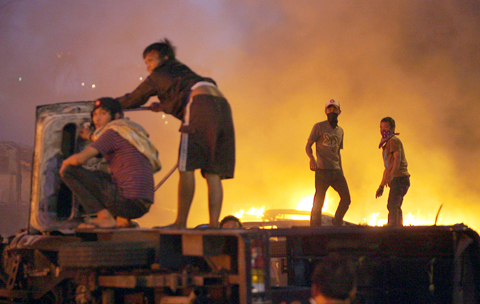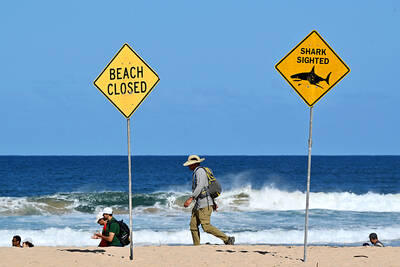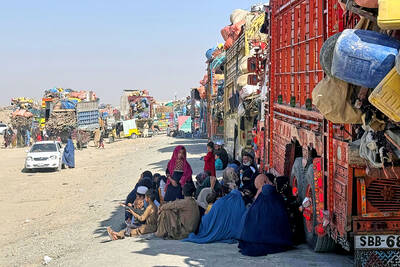Hundreds of demonstrators descended yesterday on City Hall to demand that Jakarta’s public security force be disbanded following bloody clashes over a Muslim tomb that left three dead and 156 wounded near a key seaport.
The protesters chanted “God is Great” and some threw rocks at a billboard bearing the photo of Jakarta Governor Bowo Fauzi.
More than 1,000 police were deployed to the area, which is near the US embassy in the central part of the capital, city spokesman Cucu Kurnia said.

PHOTO: EPA
On Wednesday, protesters wielding machetes, sticks and gas bombs clashed with city security officers and riot police in running battles near the port outside the city center.
Police used tear gas, rubber bullets, water cannons and batons to beat back the demonstrators.
The protesters believed the city security officers were trying to remove the tomb of an Arab cleric who helped spread Islam in Jakarta in the 18th century. The tomb is on land owned by the state-run seaports operator Pelindo II, and the area is home to many squatters.
Kurnia said the city had no intention of demolishing the tomb and had wanted to evict illegal settlers living nearby.
The protesters believed otherwise and attacked the city security officers, sparking running battles that lasted several hours and later involved the national police.
The fighting left the port area looking like a war zone, with blood and broken glass on the streets and dozens of vehicles burning. It was Jakarta’s worst civil unrest in years.
Fauzi was to hold talks yesterday with the seaport operator, heirs of the cleric and community leaders from the port area in a bid to resolve the situation.
The death toll from the clashes climbed to three with the death yesterday of a security officer who had been in critical condition, Kurnia said.
A total of 156 people were wounded, Jakarta police spokesman Colonel Boy Rafli Amar said.
Some of the injuries were severe, including an officer who had his stomach slashed and another whose hand was chopped off.
Police Lieutenant Colonel Hapsoro said scores of protesters were still gathered near the tomb yesterday, but police were able to start removing the burned out vehicles and reopen roads in the area without incident.
Customs officials said the main international container terminal would remain closed until the situation returned to normal.
Indonesian Home Affairs Minister Gamawan Fauzi dismissed the calls to dissolve the city security forces, but said the ministry would evaluate the unit’s performance to find out their shortcomings.
City security officers differ from the national police in that they don’t carry guns and don’t have as many powers. They are often poorly paid and poorly trained and are regularly accused by rights groups of abuses against minorities and the poor.
Abdul Qadir Assegaf, a religious leader in the port community, accused the city officials of using excessive force and said their actions “showed us how arrogant city security officers can be in enforcing unpopular rule.”
Indonesian President Susilo Bambang Yudhoyono expressed concern and regret over the clashes and ordered an investigation.

With much pomp and circumstance, Cairo is today to inaugurate the long-awaited Grand Egyptian Museum (GEM), widely presented as the crowning jewel on authorities’ efforts to overhaul the country’s vital tourism industry. With a panoramic view of the Giza pyramids plateau, the museum houses thousands of artifacts spanning more than 5,000 years of Egyptian antiquity at a whopping cost of more than US$1 billion. More than two decades in the making, the ultra-modern museum anticipates 5 million visitors annually, with never-before-seen relics on display. In the run-up to the grand opening, Egyptian media and official statements have hailed the “historic moment,” describing the

SECRETIVE SECT: Tetsuya Yamagami was said to have held a grudge against the Unification Church for bankrupting his family after his mother donated about ¥100m The gunman accused of killing former Japanese prime minister Shinzo Abe yesterday pleaded guilty, three years after the assassination in broad daylight shocked the world. The slaying forced a reckoning in a nation with little experience of gun violence, and ignited scrutiny of alleged ties between prominent conservative lawmakers and a secretive sect, the Unification Church. “Everything is true,” Tetsuya Yamagami said at a court in the western city of Nara, admitting to murdering the nation’s longest-serving leader in July 2022. The 45-year-old was led into the room by four security officials. When the judge asked him to state his name, Yamagami, who

DEADLY PREDATORS: In New South Wales, smart drumlines — anchored buoys with baited hooks — send an alert when a shark bites, allowing the sharks to be tagged High above Sydney’s beaches, drones seek one of the world’s deadliest predators, scanning for the flick of a tail, the swish of a fin or a shadow slipping through the swell. Australia’s oceans are teeming with sharks, with great whites topping the list of species that might fatally chomp a human. Undeterred, Australians flock to the sea in huge numbers — with a survey last year showing that nearly two-thirds of the population made a total of 650 million coastal visits in a single year. Many beach lovers accept the risks. When a shark killed surfer Mercury Psillakis off a northern Sydney beach last

‘NO WORKABLE SOLUTION’: An official said Pakistan engaged in the spirit of peace, but Kabul continued its ‘unabated support to terrorists opposed to Pakistan’ Pakistan yesterday said that negotiations for a lasting truce with Afghanistan had “failed to bring about a workable solution,” warning that it would take steps to protect its people. Pakistan and Afghanistan have been holding negotiations in Istanbul, Turkey, aimed at securing peace after the South Asian neighbors’ deadliest border clashes in years. The violence, which killed more than 70 people and wounded hundreds, erupted following explosions in Kabul on Oct. 9 that the Taliban authorities blamed on Pakistan. “Regrettably, the Afghan side gave no assurances, kept deviating from the core issue and resorted to blame game, deflection and ruses,” Pakistani Minister of